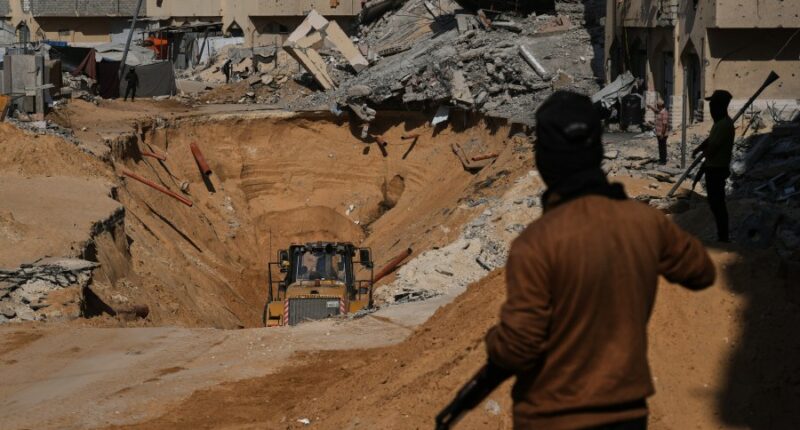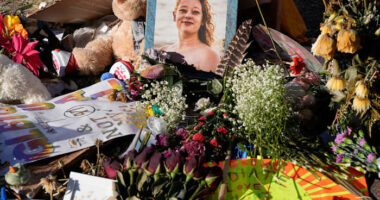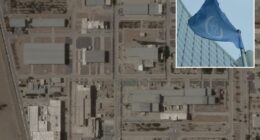Share this @internewscast.com

In a significant test to the recent U.S.-brokered ceasefire intended to end over two years of conflict, Israel launched strikes on southern Gaza on Sunday. This military action followed an incident where Israeli troops reportedly faced gunfire from Hamas militants.
According to the Israeli military, militants employed a rocket-propelled grenade against their forces, prompting a swift response featuring airstrikes and artillery fire. Prime Minister Benjamin Netanyahu, after discussions with security officials, instructed the military to adopt a firm stance against any breaches of the ceasefire, though he stopped short of suggesting a return to full-scale conflict.
The Israeli military detailed that the attack on their troops occurred in Rafah, a southern Gaza city under Israeli control as per the ceasefire agreement. Fortunately, no injuries were reported from the incident. In a separate statement, they asserted that any ceasefire violations would be met with significant force directed at Hamas.
Meanwhile, Hamas has denied involvement in the Rafah confrontation, maintaining their stance that Israel was responsible for multiple ceasefire infractions. They also indicated that discussions have commenced regarding the second phase of ceasefire negotiations, signaling a potential path towards more stable peace efforts.
Hamas, which continued to accuse Israel of multiple ceasefire violations, said that it wasn’t connected to any clashes in Rafah.
The Palestinian group also said that talks to launch the second phase of ceasefire negotiations have begun.
Strikes in Gaza
An Israeli airstrike killed at least six Palestinians in central Gaza, health officials said. The strike hit a makeshift coffeehouse on the coastal side of the town of Zawaida, according to Gaza’s Health Ministry, part of the Hamas-run government.
Another Israeli strike killed at least two people close to the Al-Ahly soccer club in the Nuseirat refugee camp, the ministry said. The strike hit a tent and wounded eight others, said Awda hospital, which received the casualties.
A third strike hit a tent in the Muwasi area of Khan Younis in the south, killing at least one person, according to Nasser hospital.
An Israeli military official told journalists there had been three incidents Sunday, two in southern Gaza and one in the north, and noted that the update was partial for now.
More bodies of hostages identified
Israel identified the remains of two hostages released by Hamas overnight.
Netanyahu’s office said the bodies belonged to Ronen Engel, a father of three from Kibbutz Nir Oz, and Sonthaya Oakkharasri, a Thai agricultural worker from Kibbutz Be’eri.
Both were believed to have been killed during the Hamas-led attack on southern Israel on Oct. 7, 2023, which sparked the war. Engel’s wife, Karina, and two of his three children were kidnapped and released in a ceasefire in November 2023.
Hamas in the past week has handed over the remains of 12 hostages.
Hamas’ armed wing, the Qassam Brigades, said that it had found the body of a hostage and would return it on Sunday “if circumstances in the field” allowed. It warned that any escalation by Israel would hamper search efforts.
Israel on Saturday said the Rafah border crossing between Gaza and Egypt would stay closed “until further notice” and its reopening would depend on how Hamas fulfills its ceasefire role of returning the remains of all 28 deceased hostages.
Hamas group says the devastation and Israeli military control of certain areas of Gaza have slowed the handover. Israel believes Hamas has access to more bodies than it has returned.
Israel has released 150 bodies of Palestinians back to Gaza, including 15 on Sunday, according to Gaza’s Health Ministry. Israel has neither identified the bodies nor said how they died. The ministry has posted photos of bodies on its website to help families attempting to locate loved ones. The bodies were decomposed and blackened. and some were missing limbs and teeth.
Only 25 bodies have been identified, the Health Ministry said.
After Israel and Hamas exchanged 20 living hostages for more than 1,900 Palestinian prisoners and detainees, the handover of remains is a major issue in the first stage of the ceasefire. A major scale-up of humanitarian aid, including the opening of the Rafah crossing, for people entering or leaving Gaza, is the other central issue.
Ceasefire’s second phase
Hamas said talks with mediators to start the ceasefire’s second phase have begun.
The next stages of the ceasefire are expected to focus on disarming Hamas, Israeli withdrawal from additional areas it controls in Gaza, and future governance of the devastated territory.
Hazem Kassem, a Hamas spokesman, said late Saturday that the second phase of negotiations “requires national consensus.” He said Hamas has begun discussions to “solidify its positions,” without giving details.
According to the U.S. plan, the negotiations will include disarming Hamas and the establishment of an internationally backed authority to run Gaza.
Kassem reiterated that the group won’t be part of the ruling authority in a postwar Gaza. He called for the prompt establishment of a body of Palestinian technocrats to run day-to-day affairs.
For now, “government agencies in Gaza continue to perform their duties, as the vacuum is very dangerous, and this will continue until an administrative committee is formed and agreed upon by all Palestinian factions,” he said.
Rafah border crossing
The Rafah crossing was the only one not controlled by Israel before the war. It has been closed since May 2024, when Israel took control of the Gaza side. A fully reopened crossing would make it easier for Palestinians to seek medical treatment, travel or visit family in Egypt, home to tens of thousands of Palestinians.
On Sunday, the Palestinian Authority’s Interior Ministry in Ramallah announced procedures for Palestinians wishing to leave or enter Gaza through the Rafah crossing. For those who want to leave Gaza, Palestinian Embassy staff from Cairo will be at the crossing to issue temporary travel documents that allow entry into Egypt. Palestinians who wish to enter Gaza will need to apply at the embassy.
The Israel-Hamas war has killed more than 68,000 Palestinians, according to the Health Ministry, which doesn’t distinguish between civilians and combatants in its count. The ministry maintains detailed casualty records that are seen as generally reliable by U.N. agencies and independent experts. Israel has disputed them without providing its own toll.
Thousands more people are missing, according to the Red Cross.
Hamas-led militants killed around 1,200 people, mostly civilians, and abducted 251 people in the attack that sparked the war.
___
Samy Magdy reported from Cairo.
___
Follow AP’s war coverage at











